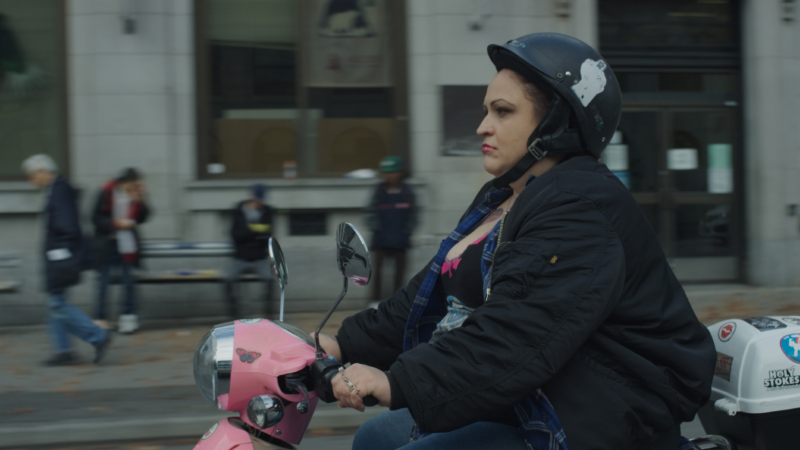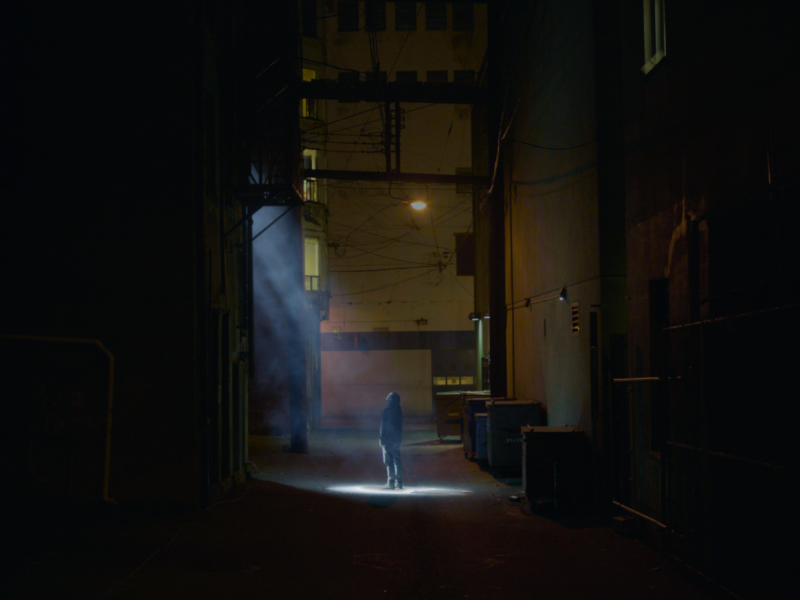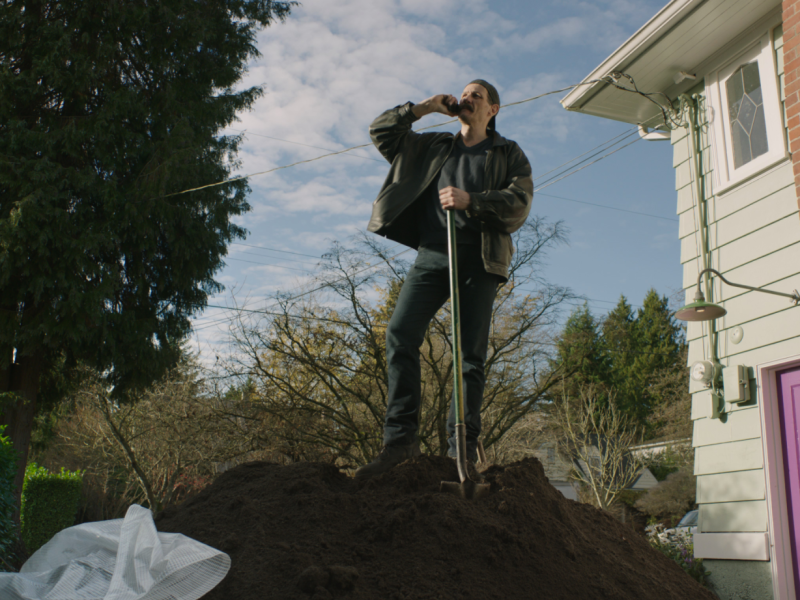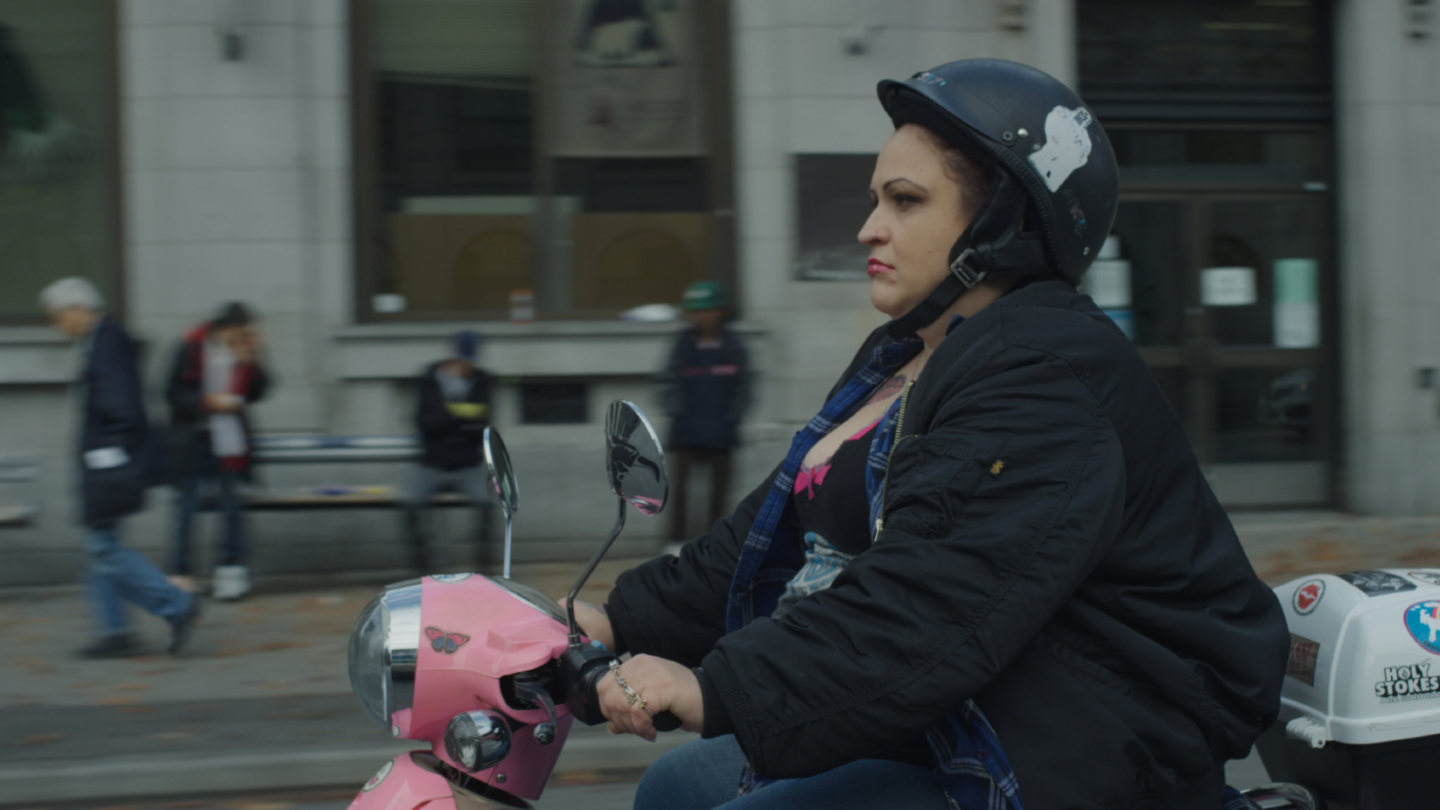An Interview with Wayne Wapeemukwa
By Holly McKenzie-Sutter
This film is part of the annual #mustseeBC filmmaker showcase presented by STORYHIVE, now open until September 28th. Visit mustseebc.viff.org/ for more details and to vote for Luk’Luk’I.
Wayne Wapeemukwa’s first feature-length documentary Luk’Luk’I shares a name with the Indigenous term for the land now known as Vancouver’s Downtown Eastside, and the film’s stars are the area’s real-life residents.
The Métis filmmaker’s previous short films Luk’Luk’I: Mother, Srorrim (“Mirrors”), and Balmoral Hotel blend elements of documentary realism, re-enactment, and fantasy to tell neglected stories from some of Vancouver’s most overlooked citizens. Luk’Luk’I reintroduces some of these characters in a longer ensemble piece that follows the lives of five residents of the Downtown Eastside, set against the backdrop of the 2010 Olympics. The hybrid documentary presents a mosaic of the city’s human reality that most hockey fans—or film festival-goers—would rather ignore. Wapeemukwa challenges that instinct with his visually and emotionally striking film that invites viewers to look outward at Vancouver and Canada from the vantage point of one of its most stigmatized neighbourhoods. I spoke to Wayne Wapeemukwa about developing the film, its intensely local setting, and building relationships with the people who brought their personal stories to the project.
Holly McKenzie-Sutter: The setting for the film is the 2010 Olympics, and you’ve used that backdrop a couple of times before. What is it about this particular time in Vancouver’s history that makes you keep returning to it?
Wayne Wapeemukwa: Well, what I find interesting is that I feel like Canada is at a crossroads, especially in light of the 150th. And in an important way, what I’m trying to do is establish a parallax between 2010 and 1867 and 2017, because I find that the Olympics is a settler colonial formation in a lot of the same ways that Canada as a state is. And so, what I’m trying to do in setting the film in 2010 is establish that parallax, and that relationship between the Canadian settler state and the Olympics as a settler colonial formation.
McKenzie-Sutter: Could you talk a little bit about how nationalism is represented in the film?
Wapeemukwa: In an important way, the film is a hybrid documentary. What this means is that I’m not only documenting reality as I understand it, but as well as the psychical reality of the non-actors in the film, which is why there’s such an important emphasis placed on fantasy. And nationalism is a lot of things, but I think most importantly, nationalism is a social fantasy, a fantasy that we as a state subscribe to, a lot of the times unknowingly, in order to cover up inconsistencies in our nation’s bloody history. So nationalism in my film is portrayed as a social fantasy that obscures the reality of revitalization, quote-unquote, and gentrification and colonialism that has been ongoing on these lands for hundreds of years.
McKenzie-Sutter: I was interested in the how the UFO plays into the story. I feel like when people go see a documentary, they don’t expect to see something like that. Could you talk about that aspect of the story?
Wapeemukwa: Yeah, that’s super important, actually. So the film itself is dedicated to Mark McKay. Eric Buurman, who is the father in the film, was Mark’s best friend, and Mark passed away leading up to production. I had the pleasure of working with Mark on my last documentary, Mirrors, and it was a really big tragedy to find out that he had a heart attack before I could say bye to him.
Mark was supposed to participate in the movie, which is why we had to re-cast his role as Joe Dion Buffalo. Mark, for his part, saw UFOS. I remember being with him on more than one occasion where he would point them out to me, but just because I can’t see them doesn’t mean that they’re not real for him. So the UFO was always an integral part of his story, but when he couldn’t participate in the production any more, we had to figure out a way to honour his story, while at the same time remaining truthful to the ethics of the film, which is to tell real life, personal stories. So when I cast Joe in the role, to me it seemed like a perfect fit because the UFO could not only function as Mark’s story, but could also serve as a metaphor for colonialism on Joe’s part, which is the function that it ended up serving most heavily in the movie.
McKenzie-Sutter: You employ a lot of non-professional actors. How do you go about casting and building relationships with people?
Wapeemukwa: Well, that’s the tricky thing, and one of the things that distinguishes my film from a lot of the others, is that it’s a movie about real people and real problems and real stories. Because it’s a movie about real conversations that we should be having today, and in order to get started on a project like this, there’s no such thing as a set schedule that I can adhere to. Like, you could normally just cast actors and get going on a normal fiction movie, [but] this has been a collaborative process that has taken years of relationship building, trust founding, and you know, a lot of volunteerism and hanging out. That’s basically the foundation of the movie, is the trust and love that these relationships are founded upon.
McKenzie-Sutter: The movie deals with many stories that are real and have actually happened to these people. How do you go about navigating stories that could be re-traumatizing to somebody when working on a film like this?
Wapeemukwa: Totally. Absolutely. So, there’s two different dimensions to that—in production, and in watching the movie, right? When we were actually filming some of these scenes, and in particular some of the scenes with Roller Girl, and her arrest, which was a real story that happened to her, definitely one of the things I was worried about was revitalizing some of these traumas.
I took great pains to walk the non-actors through these moments, make sure they were comfortable, have a lot of case management, baby steps, lots of rehearsals, and just make sure that everybody was comfortable and on the same page. And I found out, miraculously, something amazing happened, which was that in the context of a fiction, a lot of these quote-unquote traumatic scenes were actually able to be approached with great comfort by the non-actors who experienced them. And that’s solely by bent of it being a fiction, you know? By just acting out these scenes and knowing that they’re made up and that they’re fictional, despite being based on real events, it enabled there to be a sort of distance between these events and the non-actors, so they were able to approach them with great comfort and courage, in my opinion.
And the same goes for watching the movie. I was very worried about how the non-actors involved might react to some of the scenes, but after having shown everyone the movie, there were a lot of emotional and sensitive reactions that they had, but at the forefront was a great bravery and acceptance of the movie and the scenes.
McKenzie-Sutter: The Downtown Eastside is an area in Vancouver’s past and present that’s often sensationalized in the media. What do you want people to take away from seeing the film?
Wapeemukwa: One of the things I would like people to take away is a change in perspective. I think oftentimes we view the Downtown Eastside as a marginalized community, and it certainly is in terms of socio-economic factors, but what I would like to do is actually flip the perspective. Instead of thinking about the Downtown East Side on the margins of Vancouver, I think we ought to think about Vancouver as on the margins of the Downtown Eastside. The Downtown Eastside is actually unlike any otherplace in Canada, yet [it’s] remarkably telling about the whole of our country and its history, and it’s from that perspective that we should be viewing the rest of Canada. Not from the outside in, but from the inside out, out from the Downtown Eastside.
McKenzie-Sutter: At the end of the whole process, were you surprised by how the finished film came together?
Wapeemukwa: Yeah, I was entirely surprised. I mean, that’s the beauty of hybrid fiction, is that I can write down exactly what I want, and I can write down exactly how I want to film it, but at the end of the day, once you press record on the camera, it doesn’t matter how many rehearsals I’ve done with any of the non-actors—any of the actors, even—ultimately, what happens is pure spontaneity. And that’s ultimately something that I can’t provide as a director, that’s something that the non-actors involved in the project are offering with great virtuosity. They’re offering something that’s entirely unpredictable, spontaneous, and real.
McKenzie-Sutter: Are there any moments from working on the film that really stand out for you?
Wapeemukwa: I think one of the things that touched me the most when making the movie was doing the scenes with Eric and his son. That’s his actual son, Justin, in the movie, who I was able to find during pre-production for my short documentary last year called Mirrors. Eric wanted to meet his son and go to Playland with him. So I was able to find him, because they hadn’t been in touch for over a couple decades.
I kept in touch with Justin leading up to Luk’Luk’I, and he offered to fill the role of Eric’s son. And it was really hard for me personally doing a lot of those scenes, because listening to Justin talk about his dad was like hearing myself talk about my father. It hit a lot of personal chords with me. And you know, one of the amazing things that happened in the movie, that perhaps other people can take away, is that I actually found myself in a lot of Eric’s stories. And I hope that other people find themselves in these reflections as well.
Luk’Luk’I is screening at the Vancouver International Film Festival as part of the SEA TO SKY program stream on Tuesday, October 3 and again Sunday, October 8. Tickets available here.



